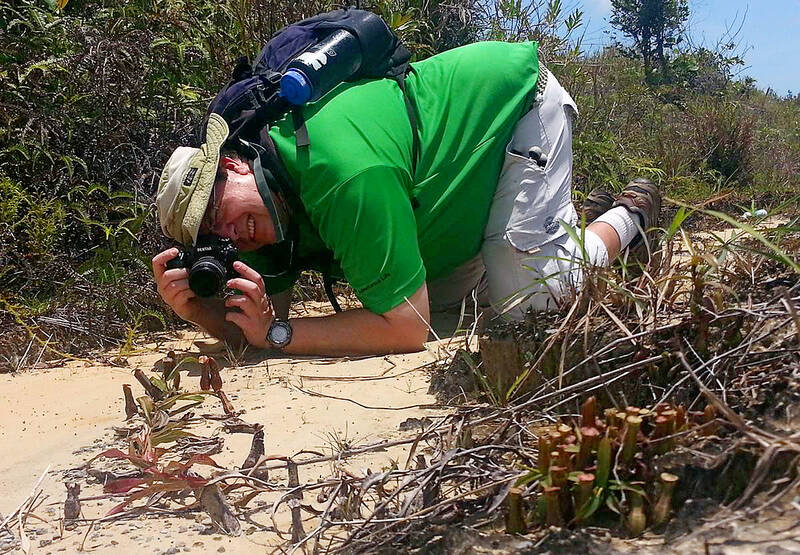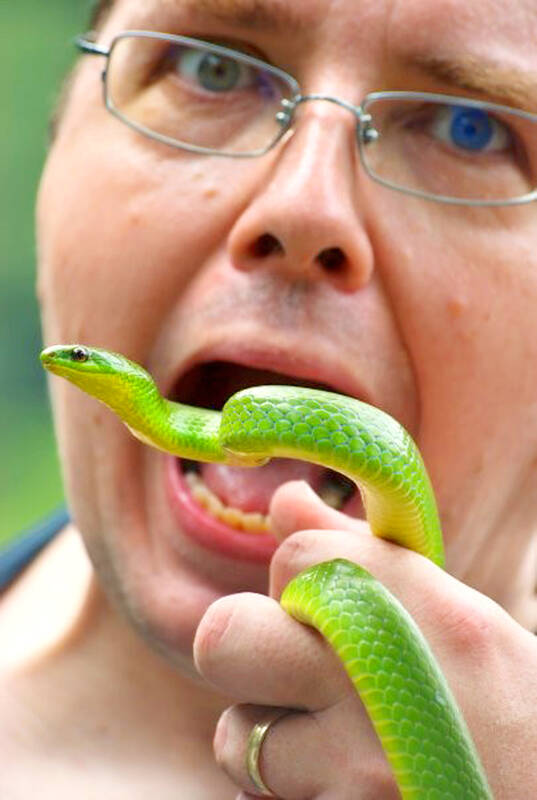Some people will never forget their first meeting with Hans Breuer, because it occurred late at night on a remote mountain road, when they noticed — to quote one of them — a large German man, “down in a concrete ditch, kicking up leaves and glancing around with a curious intensity.”
This writer’s first contact with the Dusseldorf native was entirely conventional, yet it led to a friendly correspondence that lasted until Breuer’s death in Taipei on Dec. 10. I’d been told he’d be an excellent person to talk to for an article I was putting together, so I telephoned him, and we chatted about the hobby known as herping.
He made a compelling case, explaining why nature lovers in Taiwan should go out after dark to find reptiles and amphibians in their natural habitats, and how they could do it. The conversation ended with Breuer inviting me to meet up with him and his family in Malaysia.

Photo courtesy of the Breuer family
PASSION FOR WILDLIFE
Countless individuals, among them local schoolchildren and Western expatriates, found Breuer’s passion for snakes and other wildlife infectious.
By answering strangers’ questions via www.snakesoftaiwan.com (a Web site Breuer curated with Bill Murphy, an American living in Taoyuan), visiting elementary schools to explain the role of snakes in forest ecosystems, and engaging with hikers, cyclists and others he encountered while searching Yangmingshan National Park or the North Cross-Island Highway for legless reptiles, Breuer educated thousands about the diversity of Taiwan’s snake population. Convincing those he met that these creatures should be treasured rather than feared was very much part of his mission.

Photo courtesy of the Breuer family
When taking deep-dives into local nature, things didn’t always go to plan. Dave Johnson recalls one such occasion.
“Visibly and audibly pleased with himself on discovering and promptly grabbing a particularly well-concealed snake from a ditch, Hans turned and proceeded to step on the head of a rather obvious serpent slithering across the road, causing its immediate demise!”
Johnson, a British businessman who divides his time between Taipei and Taitung, recalls his German friend as “a genuine storybook of a person.”

Photo courtesy of the Breuer family
Breuer first arrived in Taiwan in 1989, having studied Sinology at Ruhr-Universitat Bochum. Various translation and interpretation jobs followed. He once told this writer that an early client was an old-school German businessman who often visited his suppliers in Taiwan, but spoke neither English nor Chinese, and who insisted on eating every meal at McDonalds.
Later, he established a company that offered language localization services to the computer game industry. This allowed him to work from home — and in 2011 to relocate with his wife and two sons to Kuching in the Malaysian state of Sarawak. He said he had two main motives for moving away from New Taipei City’s Sanjhih District (三芝): He wanted his children to attend an international school in Kuching, and he hoped to explore Borneo’s fabulous ecosystems.
The eight-year sojourn was successful on both counts. The family thrived, and Breuer’s adventures in the jungles and national parks of Sarawak inspired his second book, A Greenhorn Naturalist in Borneo (2022). His first, titled A Cobra Hijacked My Camera Bag! Snakes and Stories from Taiwan, was published in 2012.
GOURMAND
In addition to being a herper and a birder, Breuer was a gourmand. Over the course of two visits, in 2017 and 2019, he introduced this writer’s family to some of Kuching’s finest eateries, and explained why Sarawak laksa (a spicy noodle dish) was one of humanity’s greatest inventions. Everyone who knew him knew he also adored durians.
After the family moved back to Taiwan, his social media feed featured more recipes than snakes, prompting him to post: “What has become, alas! Of the great python hunter? Spending all Sundays now cooking. Not chasing the Lindwurm. Is it old age?”
Breuer leaves behind innumerable friends, wife Lisa Liang (梁素芬), and sons Hans Jr and Karl. Hans Jr works in sales for an online tuition center. Karl is in his last year at National Taiwan University of Arts (NTUA), where he’s a mainstay of the NTUA Sharks basketball team.

Taiwan has next to no political engagement in Myanmar, either with the ruling military junta nor the dozens of armed groups who’ve in the last five years taken over around two-thirds of the nation’s territory in a sprawling, patchwork civil war. But early last month, the leader of one relatively minor Burmese revolutionary faction, General Nerdah Bomya, who is also an alleged war criminal, made a low key visit to Taipei, where he met with a member of President William Lai’s (賴清德) staff, a retired Taiwanese military official and several academics. “I feel like Taiwan is a good example of

March 2 to March 8 Gunfire rang out along the shore of the frontline island of Lieyu (烈嶼) on a foggy afternoon on March 7, 1987. By the time it was over, about 20 unarmed Vietnamese refugees — men, women, elderly and children — were dead. They were hastily buried, followed by decades of silence. Months later, opposition politicians and journalists tried to uncover what had happened, but conflicting accounts only deepened the confusion. One version suggested that government troops had mistakenly killed their own operatives attempting to return home from Vietnam. The military maintained that the

Taipei Mayor Chiang Wan-an (蔣萬安) announced last week a city policy to get businesses to reduce working hours to seven hours per day for employees with children 12 and under at home. The city promised to subsidize 80 percent of the employees’ wage loss. Taipei can do this, since the Celestial Dragon Kingdom (天龍國), as it is sardonically known to the denizens of Taiwan’s less fortunate regions, has an outsize grip on the government budget. Like most subsidies, this will likely have little effect on Taiwan’s catastrophic birth rates, though it may be a relief to the shrinking number of

Since its formation almost 15 years ago, Kaohsiung rock band Elephant Gym (大象體操) has shattered every assumption about contemporary popular music, and their story is now on screen in a documentary titled More Real Than Dreams. It’s an unlikely success story that says a lot about young people in Taiwan — and beyond. For a start, their sound is analog. In the film, guitarist Tell Chang (張凱翔) proudly says: “There is no AI in our sound.” His sister, bass player KT Chang (張凱婷) is the true frontwoman — less for her singing abilities than for her thunderous sound on the instrument. Fast like